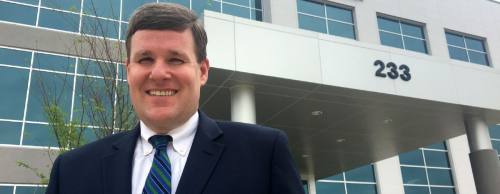Following a 24-year career in the industry, Evan Roberson has spent the last four years serving as the executive director of Tri-County Behavioral Healthcare.
Tri-County Behavioral Healthcare is a community service center that serves Montgomery, Liberty and Walker counties. The organization provides services for children and adults with serious and persistent mental illnesses, intellectual disabilities and substance abuse disorders.
“My core belief is that every human being has value, and I think that the people we serve with disorders are some of the, frankly, least valued in our society,” Roberson said. “But I believe if you think they have value, you need to put action to it.”
Governed by a board of trustees appointed by each county’s commissioners court, Tri-County Behavioral Healthcare also has facilities in the cities of Huntsville, Cleveland and Liberty. Roberson said roughly 70 percent of the center’s clients come from Montgomery County.
With rapid population growth in the area and an increased demand for services, the center relocated last month in Conroe to 233 Sgt. Ed Holcomb Blvd., Conroe, to better provide service for clients in Montgomery County.
What are the biggest behavioral health issues in Montgomery County?
Access to substance abuse treatment would have to be the No. 1 priority in Montgomery County, [and] it is not just if you’re low income or indigent. Typically, people who are abusing substances are also mentally ill—rarely is it ever just substance abuse—and we only have a small program. Residential treatment and residential detox are needed so badly in our community. Right now all of that treatment is in Houston, and it is not easy for people to get there.
What are some of Tri-County Behavioral Healthcare’s newest programs and initiatives?
Our Crisis Intervention Response Team pilot program has been going on for about a year now—that has been really successful. It is a collaboration between us and the Conroe Police Department, where we pair up two licensed mental health staff with two trained police officers who make emergency response calls to people who may have a behavioral health crisis going on. So we have been able to divert a lot of those people who previously would end up in jail or in an emergency room. We have also discovered a lot of brand new folks with pretty complicated mental health problems that were not even in the system before and have been able to get them the help they need.
How has Tri-County Behavioral Healthcare changed over time?
We’ve grown rapidly over the past several years and some of that is population driven and some of that is driven by state and grant funding that has allowed us to expand our services. We service twice as many kids and about 50 percent more adults today than we did four years ago, and last year we saw more than 800 people at our crisis stabilization enter. Just in 2016, we served more than 10,000 people total in the entire tri-county area.
What are your future plans for Tri-County Behavioral Healthcare?
We are really working to provide more services for persons with intellectual disabilities because the waiting list for the state has about 80,000 people on it. They only open 1,000-1,500 slots per year, so the list is just growing exponentially. We also really want to find a way to do more with autistic kids because autism is not neurodegenerative, meaning it is static. So if you catch autism early enough, you can actually change the trajectory of someone’s life. We would also like to provide more integrated health care because a lot of our indigent clients with mental illnesses and intellectual disabilities also have significant physical health problems, but do not have access or the ability to see a private doctor.
How will your new location allow you to carry out these plans for expanded services?
Our new location is a three-story, 90,000-square-foot building, and when all is said and done we will have 230 staff members and provide services for about 4,000 clients per year. All outpatient services in Montgomery County will take place in the new building including outpatient mental health treatment, outpatient substance abuse treatment, intellectual disabilities services, diagnostic assessments and intake processes. Our new building will have six conference rooms, which will allow us to do more community integration and outreach because we will now have space to meet with community groups to discuss issues related to mental health.
Do you have plans to expand Tri-County Behavioral Healthcare to any other areas of the three counties?
One of our biggest growth areas is Cleveland—our office there has reached capacity, and we are having a hard time meeting all the needs there. One of these days we are probably going to have to look at putting a clinic out in East Montgomery County, near the New Caney, Splendora area. There is a lot of need for our services out there, and right now they have to travel to north to Cleveland or west to Conroe for our services.




